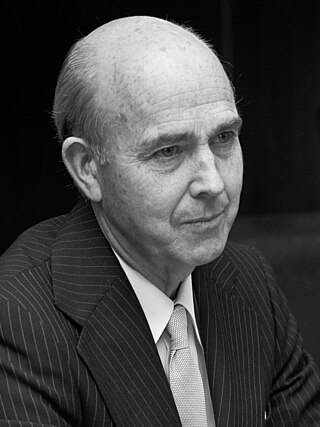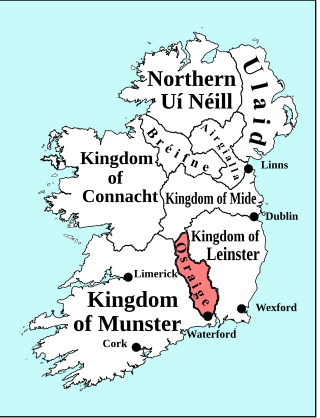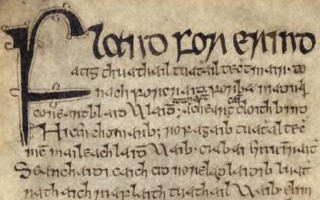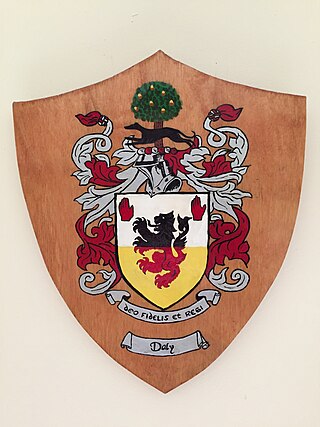
Cearbhall Ó Dálaigh was an Irish Fianna Fáil politician, judge and barrister who served as the fifth president of Ireland from December 1974 to October 1976.
The 1974 Irish presidential election resulted from the sudden death in office of President Erskine H. Childers. Cearbhall Ó Dálaigh was elected unopposed as the fifth president of Ireland.
Events from the year 1978 in Ireland.
Events from the year 1976 in Ireland.

Osraige or Osraighe, Osraí, anglicized as Ossory, was a medieval Irish kingdom comprising what is now County Kilkenny and western County Laois, corresponding to the Diocese of Ossory. The home of the Osraige people, it existed from around the first century until the Norman invasion of Ireland in the 12th century. It was ruled by the Dál Birn dynasty, whose medieval descendants assumed the surname Mac Giolla Phádraig.
Donnchadh Mór Ó Dálaigh was an Irish poet and master of the Irish classical style called Dán Díreach, who died in 1244. Mor is the Irish word for "great".

Flann mac Máel Sechnaill, better known as Flann Sinna, was the son of Máel Sechnaill mac Máele Ruanaid of Clann Cholmáin, the leading branch of the Southern Uí Néill. He was King of Mide from 877 onwards and a High King of Ireland. His mother Land ingen Dúngaile was a sister of Cerball mac Dúnlainge, King of Osraige.

The Ó Dálaigh were a learned Irish bardic family who first came to prominence early in the 12th century, when Cú Connacht Ó Dálaigh was described as "The first Ollamh of poetry in all Ireland".
Cerball mac Dúnlainge was king of Ossory in south-east Ireland. The kingdom of Ossory (Osraige) occupied roughly the area of modern County Kilkenny and western County Laois and lay between the larger provincial kingdoms of Munster and Leinster.
Bardic poetry is the writings produced by a class of poets trained in the bardic schools of Ireland and the Gaelic parts of Scotland, as they existed down to about the middle of the 17th century or, in Scotland, the early 18th century. Most of the texts preserved are in Middle Irish or in early Modern Irish, however, even though the manuscripts were very plentiful, very few have been published. It is considered a period of great literary stability due to the formalised literary language that changed very little.
Cearbhall Óg Ó Dálaigh, sometimes spelt in English as Carroll Oge O'Daly, was a 17th-century Irish language poet and harpist, who composed the song "Eileanóir a Rún".
Gofraid is an Irish masculine given name, arising in the Old Irish and Middle Irish/Middle Gaelic languages, as Gofhraidh, and later partially Anglicised as Goffraid.
Dallán mac Móre, fl. c. 900, was an Irish poet, and chief bard to King Cerball mac Muirecáin of Leinster (reigned 885–909. The poem The Song of Cerball's Sword is attributed to Dallán.
The Ollamh Érenn or Chief Ollam of Ireland was a professional title of Gaelic Ireland.
Máel Íosa Ua Dálaigh was an Irish poet. He died in 1185.
Cú Connacht Ua Dálaigh,, died 1139.
Cearbhall mac Lochlainn Ó Dálaigh was an Irish poet.
Aonghus Ó Dálaigh was an Irish poet.
Cellach mac Cerbaill was king of Osraige from 905 to his death in 908.
This page is based on this
Wikipedia article Text is available under the
CC BY-SA 4.0 license; additional terms may apply.
Images, videos and audio are available under their respective licenses.



